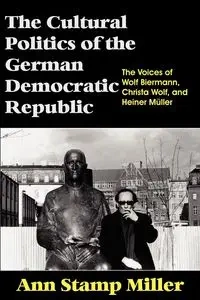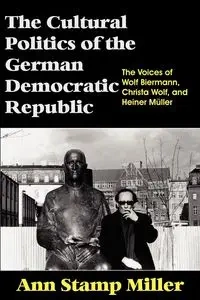The Cultural Politics of the German Democratic Republic - Ann Miller
The Cultural Politics of the German Democratic Republic - Ann Miller
- The Voices of Wolf Biermann, Christa Wolf, and Heiner Müller
EAN: 9781581124149
Symbol
311EYJ03527KS
Autorzy
Ann Miller
Rok wydania
2004
Elementy
240
Format
15.2x22.9cm
Język
angielski

Bez ryzyka
14 dni na łatwy zwrot

Szeroki asortyment
ponad milion pozycji

Niskie ceny i rabaty
nawet do 50% każdego dnia
Niepotwierdzona zakupem
Ocena: /5
Symbol
311EYJ03527KS
Kod producenta
9781581124149
Autorzy
Ann Miller
Rok wydania
2004
Elementy
240
Format
15.2x22.9cm
Język
angielski

This book deals with the intricate connection between the political structure of the East German government and cultural politics. Specifically, it focuses on the relationship between the government agencies and three authors.
It explores the difficulties the writers encountered in the 1960s with the government of East Germany and how their works did or did not conform to the cultural policy established by the GDR regime in 1951. The government believed that it was imperative for authors and artists to adhere to the literary policy of social realism prescribed by the East German Ministry of Culture. An author's works were expected to conform to the political ideology of Marxism. The Ministry of Culture expected writers to depict the society through the glorification of Marxism. The East German cultural functionaries evaluated a piece of literature more for the author's devotion to the political doctrine than the aesthetic quality of the work. If works did not conform, the government agencies such as the Ministry of Culture could apply pressure to the authors in many forms: censorship, silencing, fines, prosecution, surveillance and, for extreme cases, expatriation.
This study assesses three prominent writers of the former East Germany: Wolf Biermann, a lyricist; Christa Wolf, a novelist; and Heiner Müller, a dramatist. The analysis is based on the political content of the authors' works and how the West German and East German critics evaluated them. Government documents from German State Archives revealed the sensitive nature of the political and writer conferences of the GDR. The study analyzes how the writers' interpretation of socialism increasingly deviated from that of the East German regime. Over time, the writers chose to express themselves in a different manner and thus, encountered problems and conflicts with the Ministry of Culture.
EAN: 9781581124149
EAN: 9781581124149
Niepotwierdzona zakupem
Ocena: /5
Zapytaj o produkt
Niepotwierdzona zakupem
Ocena: /5
Napisz swoją opinię

